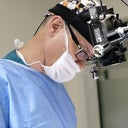Otoplasty Chronic pain - what can I do? (photos)
I had an otoplasty on 30/05/2019, after removing the helmet I noticed that the ears were practically the same (a little more glued on top). After 1 month of surgery I went to the hairdresser and he bent my ears, I was in pain for about 3 days, but I soon recovered. About 6 to 9 months after the otoplasty, I started to feel pain in the upper part of the ear at the incision site. I contacted my surgeon and he told me I had chronic pain. What can i do ?



